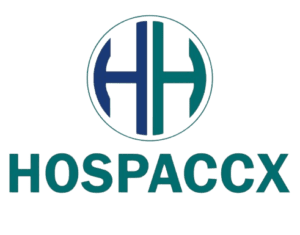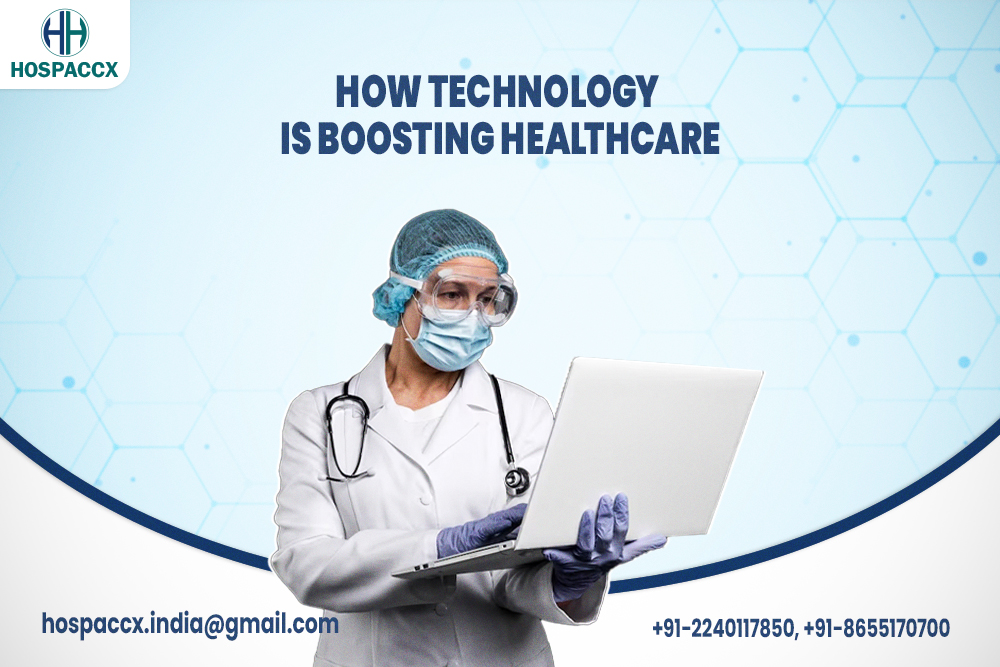Are you looking for the information related to healthcare sector? Hospaccx healthcare consultancy has mapped all the information related to how technology is boosting healthcare in India.
This is the superficial and macro level survey if you need a refined market and financial feasibility or any other study related to healthcare is required you can contact Hospaccx Healthcare business consulting Pvt. ltd on Hospaccx.India@gmail.com or you can visit our website on
INTRODUCTION:-
A health technology is the application of arranged and structured knowledge in the form of devices, medicines, services, vaccines, procedures and systems developed to solve a health problem and improve the quality of lives.
Technology in healthcare has become more extensive over last 20 years and figures to increase in conjunction with our societal technological advancements. The use of technology increases provider capabilities and patient access while improving the quality of life for the patients and saving the lives of others. The advancement of IT in healthcare sector challenges and improves performance and patient experience.
The involvement of IT in healthcare proves to be an antidote to tackle many issues, let’s take an overview of some challenges:-
- Low doctor-to-patients ratio.
- Lack of healthcare information to citizens and patients.
- Lack of proper facility management.
- Basic infrastructure.
- Paper based record keeping system.
- Absence of referral mechanisms.
REVOLUTIONIZING HEALTHCARE:-
By addressing these traditional challenges of healthcare, technology is bringing the radical change in this sector. Use of android systems can access the patient’s records easily and use of telehealth to expand and reach to rural communities, technology is making new roads to every aspect of healthcare and tackling new challenges.
Technology has broadly and rigorously impacted healthcare today and is already shaping how it will look in near future. Healthcare technology has the potential to cut the fats of traditional challenges, those are rise in costs, waiting times, inefficiencies in drug development and limited access to insurance and healthcare providers.
Consultations with specialists, targeted treatments and the availability of spontaneous mobile apps have led to progress in patient care and exceptional healthcare experience.
Also the newer treatment technologies are leading to a better quality outcome and enhancing the life of the patients as well.
SOME KEY TECHNOLOGIES OF FUTUTRE INCLUDE:-
SURGERY:
Surgery has been some of the biggest improvements in healthcare technology. Robots are assisting doctors in a variety of operations, from minor operations to open heart surgery. These robotic surgical assistants comes in all shapes and sizes ranging from tiny bots that crawls on the surface to the big arm machines that helps doctors with the extra work during the procedures. Because of these recovery times are also reduced. With the availability of procedures like robotic knee surgery and gene therapy in cancer treatment, it is evident that the role of technology in healthcare will grow rapidly in time to come.
DRUG DEVELOPMENT:
The pharmaceutical industry is using Artificial Intelligence (AI) and machine learning to power a new wave of drug research and development. These tools are being used in the variety of fields across the industry to help boost up time-consuming tasks like certain chemical combinations that might help create the optimal drug and identifying patients who could best benefit from a particular drug trial.
DIAGNOSTICS AND ERROR REDUCTION:
The healthcare industry is now using various technological tools to tackle major problems like incorrect and overdue diagnosis. By acquiring technology into genetics, pathology and other important diagnostic fields it has became easier to detect deadly diseases like cancer before hand and with great accuracy.
DIGITIZATION OF HEALTHCARE:
Bundles of paper files are slowly converting into digital records that can be uploaded and stored to the cloud and made accessible to healthcare professionals and patients. By this modifications, storing, managing and transmission of data becomes easy and quick. By uploading the proper information it is easily accessible and supportive for the professionals and patients to take more precise medical decisions.
This digitization has the ability to modernize processes, improve patient outcomes, and lower costs.
ARTIFICIAL INTELLIGENCE (AI) IN HEALTHCARE:
It is defines as the combination of science and the engineering on creating intelligent computer systems that are able to perform tasks without receiving any instructions directly from humans. AI provides maintenance of health via prevention, diagnosis and treatment of diseases, and mental impairments in human beings.
AI is leading to advancements in healthcare treatments. It has the ability to quickly and more precisely identify signs of diseases. Patients can also ask medical related questions and receive answers in absence of a doctor. It can also achieve fast and accurate diagnostics. It helps in reducing the cost. The major aspect is that it helps to reduce human errors as it is already programmed.
ELECTRICAL HEALTH RECORDS (EHR):
EHR consists of digital data of patient’s medical history. It may consist of various reports, diagnosis, treatments and surgical data, last visit to the hospital, etc. these records of patients health makes easy for more accurate diagnosis and improve patient care.
These electronic data help labs and specialists for easy sharing of data of patients without time consuming. It also provides information about patient’s allergies and intolerances and about anything that may be similar, especially when the patient is unconscious.
EHR also helps to increase accountability and reduce the malpractices. EHR is easy to maintain and is less time consuming and hence it reduces the chance of mistakes being made.
MOBILE APP TECHNOLOGY:
Mobile apps help to keep the track of doctor’s appointment, set reminders to take the medicines on time, etc. The health and fitness apps help to create your workout routine and thus keeping you fit and healthy, it also can plan your diet accordingly. Mobile apps also provide information about various drugs, prevent side effects, problem solving and improve diagnosis.
Doctors can communicate with their patients directly without physical appearance via mobile apps and maintain their logs.
IMPROVED PATIENT CARE:
Technology plays a very important part in healthcare community; it has given potent tools to improve patient care. Using apps such as barcode scanners, doctors can quickly access to the medical errors if found. It is easy for the doctors to find the medical history of the patient through EHR.
RFID (radio-frequency identification) technology is used to enhance the patient care by providing the information about the patient’s vital signs and temperature. 3D painting is used to create prosthetics, customized dental and hearing devices.
Virtual reality and apps helps surgeon to perform complex operations, it helps patients which are mentally ill and also help with their post recovery process.
BIG DATA AND CLOUD:
Big data in healthcare refers to collecting, analyzing and leveraging consumer, patient, physical and clinical data. Big data is often processed by machine learning algorithms and data scientists. The rise of big data in healthcare comes in response to digitization of healthcare information and the rise of value based care, which has encouraged the industry to use data analytics.
Cloud storage of data helps to improve efficiency and easy access while reducing wastage. Because of the vast data available, healthcare proved to be farthest along with cloud adoption when compared to other industries. It has proven to be more advantageous for both health care provider and patients. Cloud has proven to be beneficial for cutting down the operational expenses. Cloud also amps up patient engagement with their own health plans by giving them access to their own healthcare data, thus resulting in improved patient outcomes.
POINT OF CARE DEVICE:
Point of care (POC) diagnostic devices is used to obtain diagnostic results while with the patient or close to the patient. Used in doctors’ offices, hospitals, and in patients home, POC diagnostic devices give quick feedback on many sorts of medical tests. POC has become established worldwide and fins vital roles in public health. The coupling of POC devices and electronic medical records enable test results to be shared instantly with care providers. The use of mobile devices in health care setting also enables the health care provider to quickly access patient test results sent from POC device.
POC is often accomplished through the use of transportable, portable, and handheld instruments (e.g. blood glucose meter, nerve conduction study device) and test kits (e.g. CRP, HBA1C, Homocysteine, HIV salivary assay, etc).
BLOCK CHAIN:
A block chain is the simplest of terms, a time-stamped series of immutable record of data that is managed by a cluster of computers not owned by ant single entity. Each of these blocks of data is secured and bound to each other using cryptographic principles (i.e. chain). Block chain technology is expected to improve medical record management and the insurance claim process, accelerate clinical and bio medical research, and advance biomedical and healthcare data.
Block chain technology is constantly improving rather than completed, and it has several potential challenges that must be addressed for it to be adopted for biomedical and healthcare applications
The first challenge involves transparency and confidentiality.
The second challenge involves speed and scalability.It is a theoretical but possible risk and a clear solution.
TELEMEDICINE/TELEHEALTH:
Telemedicine has taken the digitization to the next level; it is easily accessible for the patients to consult with specialists anywhere in the world. This technology is useful to overcome the distance barriers and facilitate critical care in emergency hence it save more and lives too.
Telemedicine has made telemedical devices available for patients to receive home care. This can significantly reduce the waiting time for patients and speeds up the recovery process.
Telemedicine has also reached to the remote patients by monitoring their health status by healthcare specialists. Real-time interactions help in better diagnosis, counseling and monitoring patients.
CONCLUSION:-
With all the advancement in technology, the healthcare industry is growing day by day. With all the above technologies mentioned, the top 4 best technologies are
- Artificial Intelligence (AI)
- Robotic surgeries
- Mobile app technologies
- Telemedicine/Telehealth
These technology based transformations can make a huge difference among the healthcare industries and take it to the next level for improved quality and patient satisfaction.
Do you want to know about impact of upcoming technologies in healthcare industry? We can help you in same, below are the digital healthcare services that we offer:-
- Web Content
- Web Designing
- Website Development
- Digital Marketing
- Designing Mobile Application
- Search Engine Optimization
- Social Media Marketing





Related Team Members











